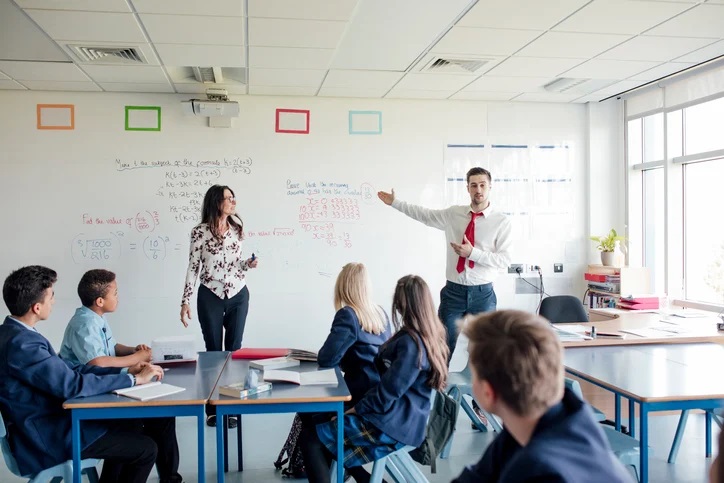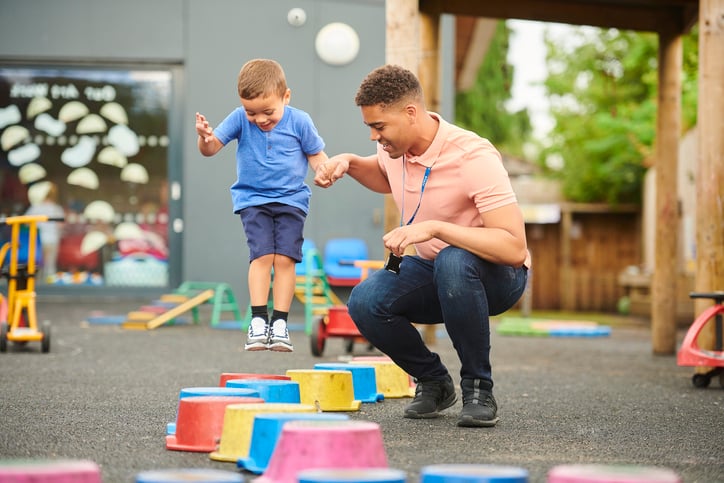Leveling Up the Power of Paraprofessionals
Just as a gymnast relies on a spotter, a tree draws strength from its roots, and a musical relies on its stage crew:
Special education classrooms rely on paraprofessionals, the unsung heroes of these classrooms.
While they often handle tasks like making copies or organizing classrooms, their potential goes far beyond these basic responsibilities when equipped with the right resources. Instead of relying on the special education teacher as the only means of learning, districts can provide paras the tools to uplift classroom goals and amplify learning.
The Importance of Paraprofessionals Inside and Outside the Classroom
Unfortunately, school districts often target paraprofessionals for budget cuts, eliminating their positions first. Yet, they're the last to leave the playground on cold winter days. Troy Dean, a paraprofessional from Marshall Public School District, exemplifies the significant impact these professionals can have. He received the NBC15's Crystal Apple award, a distinction given to educators who've profoundly influenced students' lives. Troy has been helping special needs students throughout the district for seven years. His commitment and dedication are evident in the classrooms he supported and the community events he started. Students and peers acknowledge his positive influence, from fostering representation as one of the few black educators in the district to his compassionate approach to supporting students—stories like Troy's underline paraprofessionals' profound effect on the educational community.
An EdWeek article highlights paraeducators as being foundational in special education. Yet, despite their pivotal role, they often need more crucial professional development. Ritu Chopra shares the outcome of this oversight: "[it’s] putting our least-trained people with students with the most challenging needs." Equipping paras with proper training can transform them from support staff to co-teachers who collaboratively enhance the classroom experience.
Challenges Faced by Paraprofessionals
School districts across the country are facing a problem. More students need special education, but schools lack enough qualified teachers. There’s also a notable shortage of paras. The educators and support staff who continue to stay need more resources to leverage their time within the classroom to make meaningful gains.
This only perpetuates turnover. Without adequate support from administrators and the resources needed to enact results, it makes the decision to leave the school district all the more enticing.

The Power of Co-Teaching
Co-teaching goes beyond merely sharing a classroom; it's about shared accountability and partnership. This collaborative approach can benefit students by offering diverse teaching techniques and accommodating various learning styles. As emphasized by Jodi Johnston, Principal and Director of Admissions at Julie Billiart's Lyndhurst campus, a significant advantage is that one teacher leads a lesson; the other provides support, collects data, or assists specific students. This duality ensures more tailored instruction and swift adjustments based on student needs.
Optimizing Paraprofessional Involvement in Co-Teaching
The ASCD article "Critical Ways to Support Special Education Paraprofessionals" by Kimberly Eckert highlights the indispensable role paraprofessionals play in the educational landscape. It underscores the reality that many paraprofessionals, though deeply committed, often need more training and resources to optimize their skills fully. By providing growth opportunities, such as surveys to gauge learning areas of interest or structured training programs, we can better prepare paraprofessionals to be effective co-teachers.

The Benefits of Collaboration for Stakeholders
Investing in paraprofessionals doesn't just improve classroom outcomes; it has a ripple effect on the entire school ecosystem. Superintendents can leverage one of their most underutilized resources to aid student achievement. Special education supervisors can better serve their most exceptional students while creating a common language and teaching framework across the district. Teachers, equipped with the support of skilled paraprofessionals, can go deeper into specialized instruction, knowing they have a reliable backup. Parents benefit, too, from enjoying peace of mind that their children are receiving consistent and all-inclusive care. Ultimately, a well-trained and confident paraprofessional bolsters the teaching team and enhances the entire educational journey for every student and stakeholder involved.
Take Your Students' IEP Goals to the Next Level With Paraprofessional Support
If districts search for ways to help their student population, the comprehensive integration and support of paraprofessionals is critical. We can amplify their contributions in the classroom by giving them the tools and resources they deserve and helping every student achieve their full potential.
Empowering paraprofessionals goes beyond mere training; it's about providing comprehensive, user-friendly resources. A pivotal way to empower paraprofessionals is through resources like those offered by STAGES® Learning. Stages Learning’s ARIS® Academic Readiness Intervention System curriculum offers a complete toolkit tailored for elementary-age autistic students and students with cognitive delays. Utilizing ARIS allows paraprofessionals to contribute to student learning goals by:
- supporting individualized learning sessions with scripted lesson plans,
- maintaining consistent data collection and communication with parents, and
- ensuring their instruction aligns with established standards and IEP goals.
With ARIS, paraprofessionals become architects of meaningful, impactful student learning experiences.
Stages Learning's ARIS curriculum is an excellent resource for districts and schools seeking to revamp their special education approach while strengthening the roles of their paraprofessionals. Speak to the Stages Learning team today.





